Location Backgound

Frankie gets up to start work at around midnight. Then again at 1.30 in the morning. Then at four. And yet again at dawn. This is a quiet night's work for Frankie. On a busy night he'll wake and work seven times.
Frankie has been doing this every night for four years. He works on a fishing platform, a wooden structure five miles off the coast of Northern Sumatra. He says he's 20, but he's probably younger. Indonesian law forbids under-18s from this kind of hard, dangerous labour.
Jermals
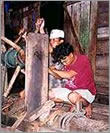 He is one of an unknown number of boys and young men working on the 150 or so platforms —called "jermals" in Indonesian— in the Malacca Straits. Each platform is like a miniature oil rig. Logs and planks lashed together, with a simple corrugated iron hut on top.
He is one of an unknown number of boys and young men working on the 150 or so platforms —called "jermals" in Indonesian— in the Malacca Straits. Each platform is like a miniature oil rig. Logs and planks lashed together, with a simple corrugated iron hut on top.
A series of nets guide fish towards the jermal. They are finally caught in a large net underneath the platform. Every couple of hours, Frankie and his seven co-workers strain at crude wooden winches pulling up the nets. The fish writhe in their death throes as they're poured out over the deck.
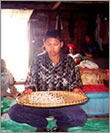 The workers separate out the valuable part of the catch —tiny anchovy-like fish— boil them, salt them and dry them on the decks. There are no days off, and the minimum stretch on board is three months. Workers are often kept there after that until a replacement can be found.
The workers separate out the valuable part of the catch —tiny anchovy-like fish— boil them, salt them and dry them on the decks. There are no days off, and the minimum stretch on board is three months. Workers are often kept there after that until a replacement can be found.
Working To Support A Family
I can't find work on shore. If I could find work on shore of course I wouldn't be here.
–Frankie, a fisher-boy
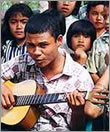 Frankie works here to ensure that his younger brothers and sisters don't share his fate. He uses his wages —around £15 a month— to pay for their school fees.
Frankie works here to ensure that his younger brothers and sisters don't share his fate. He uses his wages —around £15 a month— to pay for their school fees.
The boys come to the jermals to escape poverty, boredom and family problems. Local traditions also encourage many families to send teenage sons away from home to help them mature into men.
Isolation
I really miss my family. I miss my father and I miss my mother. I miss them all
–Harahap, another young jermal worker
When they get to sea, many suffer severely from the isolation of living in a tiny group for months on end. Frankie's friend Harahap talks of the homesickness that sets in at low tide, when the jermal is quiet.
Danger
There are rumours of bullying and abuse, including sexual abuse. Fire, thieves and storms are constant threats. Many jermals are literally falling apart, and few have safety equipment. No boats, flares, life jackets or rubber rings. All they have is a two-way radio.
I can't find work on shore. If I could find work on shore of course I wouldn't be here. Frankie, a fisher-boy
Budiman, who's 17, took a tumble off the deck of his jermal earlier this year. As he fell, his leg struck a beam and he found himself in intense pain, about to drown. He was pulled out by the other boys, and then waited for two days before he could be taken for surgery on his broken leg. Machete-wielding robbers had stolen the emergency radio the day before his accident.
Alternatives
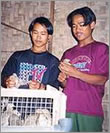 He laughs as he tells the story, sitting on a plastic chair back in his home village. He's now learning to raise a raucous brood of ducks, who live in a bamboo stockade outside his family's house. The training is part of a project run by the International Labour Organisation to provide alternatives to work on the platforms.
He laughs as he tells the story, sitting on a plastic chair back in his home village. He's now learning to raise a raucous brood of ducks, who live in a bamboo stockade outside his family's house. The training is part of a project run by the International Labour Organisation to provide alternatives to work on the platforms.
 Sri Eni Purnamawati, the ILO's project coordinator, says the idea is to give the boys —many of whom are too poor to continue with school— with some kind of stimulus which they need for development as adolescents. The project can also help families who would otherwise be losing income from jermal workers' wages.
Sri Eni Purnamawati, the ILO's project coordinator, says the idea is to give the boys —many of whom are too poor to continue with school— with some kind of stimulus which they need for development as adolescents. The project can also help families who would otherwise be losing income from jermal workers' wages.
Rescuing Underage Workers
 Eni and her husband Taufan Damanik, who works for a local nongovernmental organisation, regularly travel to the fishing platforms to check for underage workers. If they find any, they then make the arduous journey inland to locate the boys' relatives. Often the family are not aware of the conditions on the jermals and are shocked when they hear about them. Then Eni and Taufan go —usually with a family member— to take the boys home.
Eni and her husband Taufan Damanik, who works for a local nongovernmental organisation, regularly travel to the fishing platforms to check for underage workers. If they find any, they then make the arduous journey inland to locate the boys' relatives. Often the family are not aware of the conditions on the jermals and are shocked when they hear about them. Then Eni and Taufan go —usually with a family member— to take the boys home.
Since the end of the Suharto regime three years ago, their job has become easier. The law was changed to ban underage employment on the platforms. And the authorities started to give some degree of support to the effort to end the practice.
A Success Story
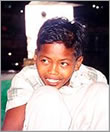 I joined Eni and Taufan on board a navy boat as they went to rescue two brothers. With the boys' uncle smoking nervously, we sailed for over 90 minutes to a dilapidated jermal.
I joined Eni and Taufan on board a navy boat as they went to rescue two brothers. With the boys' uncle smoking nervously, we sailed for over 90 minutes to a dilapidated jermal.
A small boy watched us with a mixture of excitement and trepidation. He was Andi, the younger of the two brothers and a small boy even for his 14 years.
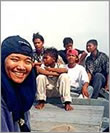 Then to our surprise, another four teenage boys on board the jermal said they also wanted to escape. After some negotiation, the foreman agreed to let them all go. No doubt the presence of the Navy helped persuade him.
Then to our surprise, another four teenage boys on board the jermal said they also wanted to escape. After some negotiation, the foreman agreed to let them all go. No doubt the presence of the Navy helped persuade him.
As the boat chugged back to shore, all 6 boys sat smiling in the prow as the salt water splashed over their faces.
ECCO Films Indonesia This film is produced with the support of the Netherlands Film Fund, World Cinema Fund, Vision Sud Est and the Hubert Bals Fund of the International Film Festival Rotterdam.
In co-production with Motel Films, Rudy Tjio, Atika Makarim, Rayya Makarim, Raam Punjabi, Wim Brouwer and Peter van der Lugt.